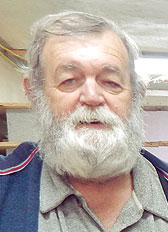
The modern definition of homesteading is a lifestyle of self-sufficiency.
It is characterized by subsistence agriculture, home preservation of foodstuffs and being as free from outside sources as possible. Modern homesteaders usually raise crops and animals that are hardy, usually heritage breeds of animals and heirloom-type crops.
Jim and Cynde Watson have just such a homestead farm in Bruno, Ark. After retiring four years ago from northern Missouri, the couple relocated to their 40-acre farm in Marion County. Neither Cynde nor Jim was raised with an extensive agricultural background, but both wanted to try homesteading. They read and did lots of research, talked to people and began to form a plan. They wanted animals that could graze and forage on pasture and in the woods, be hardy and easy to maintain.
The Watsons have selected Dexter cattle, St. Croix sheep, rabbits and Icelandic chickens.
“We started with the St. Croix sheep, then we looked into KuneKune pigs,” Cynde said. “We have raised some litters and we enjoyed that. But the paperwork – all of the registration process – was a lot of work.”
Cynde adds that the KuneKune pigs originally came from New Zealand and the Maori people raised them in their villages around their children, thus conditioning them to be friendly and gentle with people.
However, all the paperwork that was necessary to keep the breed registered was just too much. Jim and Cynde decided to discontinue with the KuneKune pigs and switch to St. Croix sheep, which originated in the U.S. Virgin Island of St. Croix.
“They’re a hair sheep, considered a heritage breed,” Cynde said. “They’re so loveable. Their babies are so darling and they’re such good mothers.”
Jim said their vet is amazed at the lack of worms and parasites in the St. Croix sheep. They’re extremely disease resistant.
Adding to the Watsons’ international menagerie of animals are their Icelandic chickens. Cynde explains that they’re an ancient breed and are considered a barnyard chicken.
“They’re as common as dirt in Iceland,” Jim explained. “They’re nothing special. That’s why there’s 40 million different colors and combinations, everything from white to black to speckled and everything in between.”
The chickens lay better during the winter months than most breeds. The eggs are a tannish-white with sturdy shells. The Icelandic chickens love picking through and turning over a compost pile, but that means that they also love pecking through a garden. Unfortunately, they’ll take the good with the bad.
Jim said that while the Icelandic chickens are common in Iceland, they’re unique to Arkansas. It can be a little pricey to get a flock started.
To round out their animal potpourri, the Watsons have a couple of rabbits.
“Rabbits truly are the best thing to raise for a homestead because they raise up really fast and we can find plenty of things to feed them year-round,” Cynde said. “If we can’t go get pellets, we can still find enough food. We get lots of meat from them.”
The most amazing thing on the Watsons’ homestead is their fodder house. Inside this climate-controlled space, they can grow wheat for their cattle and sheep. Starting with wheat seed soaked overnight in water, the Watsons spread the seed in troughs. In six days the wheat has produced a complete root system and has grown about 6 inches in height. Then Jim and Cynde harvest their wheat and use it as animal feed.
The Watsons do have solar panels, but they don’t for provide all their electrical needs. However, they have created a homestead where they can be almost self-sustaining. Their animals provide any meat they might need, and in a pinch both the Dexter cattle and the St. Croix sheep can be milked.
In the summer Jim and Cynde grow a garden and freeze-dry bags and bags of fruits and veggies. “If someone turned off the electricity tomorrow, we could survive,” Jim said.







